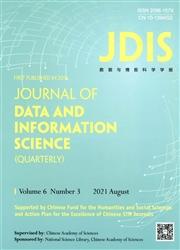Extended Lorenz majorization and frequencies of distances in an undirected network
IF 1.5
3区 管理学
Q2 INFORMATION SCIENCE & LIBRARY SCIENCE
引用次数: 0
Abstract
Purpose To contribute to the study of networks and graphs. Design/methodology/approach We apply standard mathematical thinking. Findings We show that the distance distribution in an undirected network Lorenz majorizes the one of a chain. As a consequence, the average and median distances in any such network are smaller than or equal to those of a chain. Research limitations We restricted our investigations to undirected, unweighted networks. Practical implications We are convinced that these results are useful in the study of small worlds and the so-called six degrees of separation property. Originality/value To the best of our knowledge our research contains new network results, especially those related to frequencies of distances.无向网络中的扩展洛伦兹大化和距离频率
目的 为网络和图形研究做出贡献。设计/方法/途径 我们运用标准数学思维。研究结果 我们证明,无向网络中的距离分布洛伦兹大化了链的距离分布。因此,任何此类网络中的平均距离和中位距离都小于或等于链的平均距离和中位距离。研究局限 我们的研究仅限于无向、无加权网络。实际意义 我们确信,这些结果对研究小世界和所谓的六度分隔属性非常有用。原创性/价值 据我们所知,我们的研究包含了新的网络结果,尤其是那些与距离频率相关的结果。
本文章由计算机程序翻译,如有差异,请以英文原文为准。
求助全文
约1分钟内获得全文
求助全文
来源期刊

Journal of Data and Information Science
INFORMATION SCIENCE & LIBRARY SCIENCE-
CiteScore
3.50
自引率
6.70%
发文量
495
期刊介绍:
JDIS devotes itself to the study and application of the theories, methods, techniques, services, infrastructural facilities using big data to support knowledge discovery for decision & policy making. The basic emphasis is big data-based, analytics centered, knowledge discovery driven, and decision making supporting. The special effort is on the knowledge discovery to detect and predict structures, trends, behaviors, relations, evolutions and disruptions in research, innovation, business, politics, security, media and communications, and social development, where the big data may include metadata or full content data, text or non-textural data, structured or non-structural data, domain specific or cross-domain data, and dynamic or interactive data.
The main areas of interest are:
(1) New theories, methods, and techniques of big data based data mining, knowledge discovery, and informatics, including but not limited to scientometrics, communication analysis, social network analysis, tech & industry analysis, competitive intelligence, knowledge mapping, evidence based policy analysis, and predictive analysis.
(2) New methods, architectures, and facilities to develop or improve knowledge infrastructure capable to support knowledge organization and sophisticated analytics, including but not limited to ontology construction, knowledge organization, semantic linked data, knowledge integration and fusion, semantic retrieval, domain specific knowledge infrastructure, and semantic sciences.
(3) New mechanisms, methods, and tools to embed knowledge analytics and knowledge discovery into actual operation, service, or managerial processes, including but not limited to knowledge assisted scientific discovery, data mining driven intelligent workflows in learning, communications, and management.
Specific topic areas may include:
Knowledge organization
Knowledge discovery and data mining
Knowledge integration and fusion
Semantic Web metrics
Scientometrics
Analytic and diagnostic informetrics
Competitive intelligence
Predictive analysis
Social network analysis and metrics
Semantic and interactively analytic retrieval
Evidence-based policy analysis
Intelligent knowledge production
Knowledge-driven workflow management and decision-making
Knowledge-driven collaboration and its management
Domain knowledge infrastructure with knowledge fusion and analytics
Development of data and information services
 求助内容:
求助内容: 应助结果提醒方式:
应助结果提醒方式:


